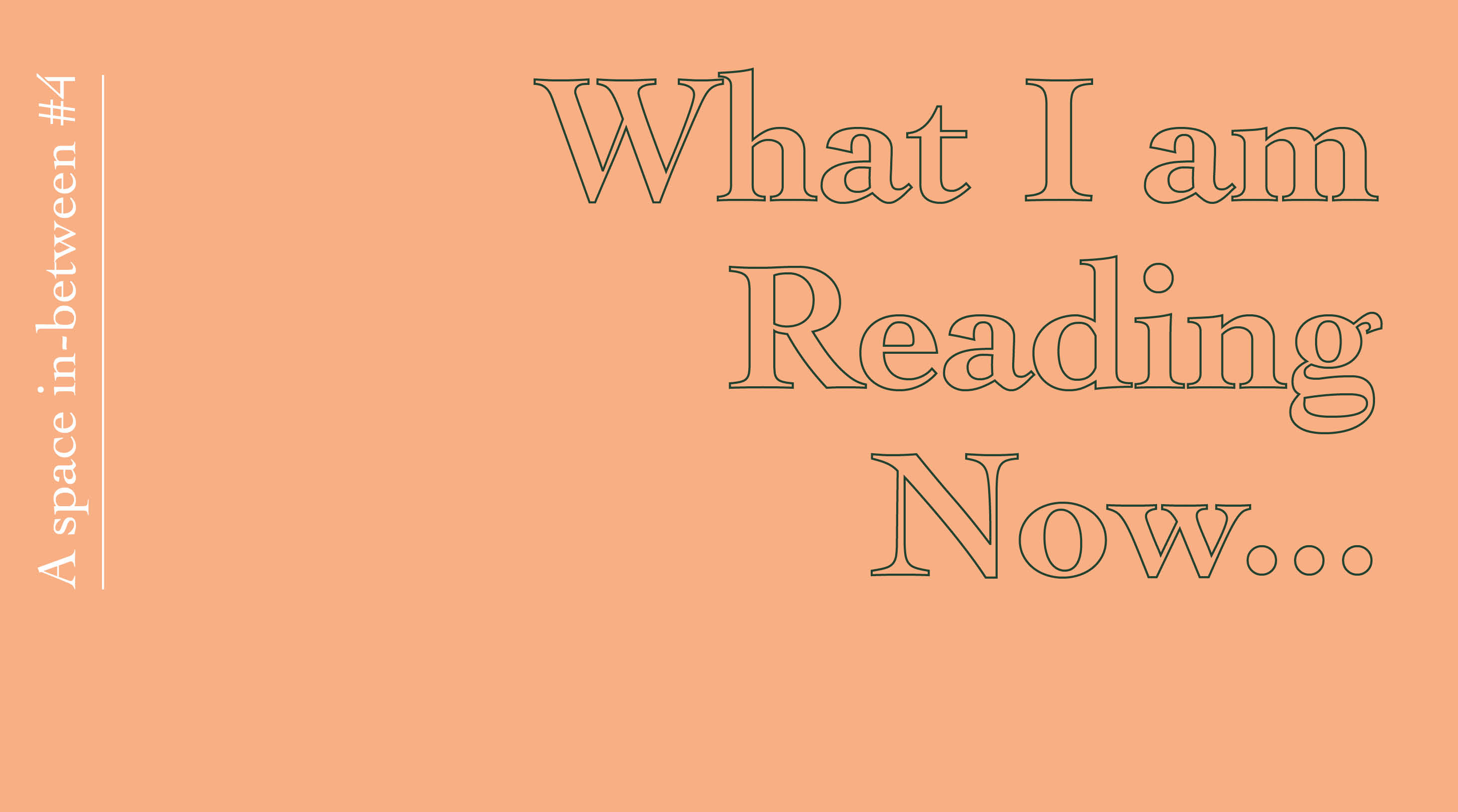What I am Reading Now…
Nhã Thuyên
March 2024
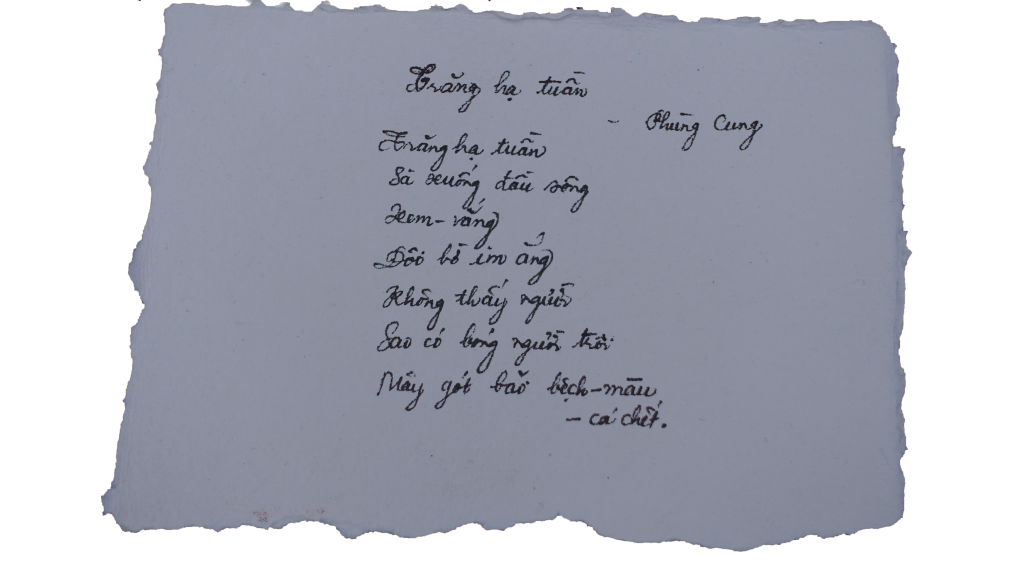
Trăng hạ tuần
Trăng hạ tuần
Sà xuống đầu sông
Xem-vắng
Đôi bờ im ắng
Không thấy người
Sao có bóng người trôi
Mây gót bãi bệch – màu
– cá chết.
(Phùng Cung, p.79)
A failed attempt at translation:
The waning moon
The waning moon
Swoops down the river’s head
Soundlessly-watching
Two banks, quiet and bare
No one there
Why is there a frail silhouette drifting
A cloud on the river’s heel pales – the colour of
– dead fish.
The moon wanes, so do I.
“not enough”
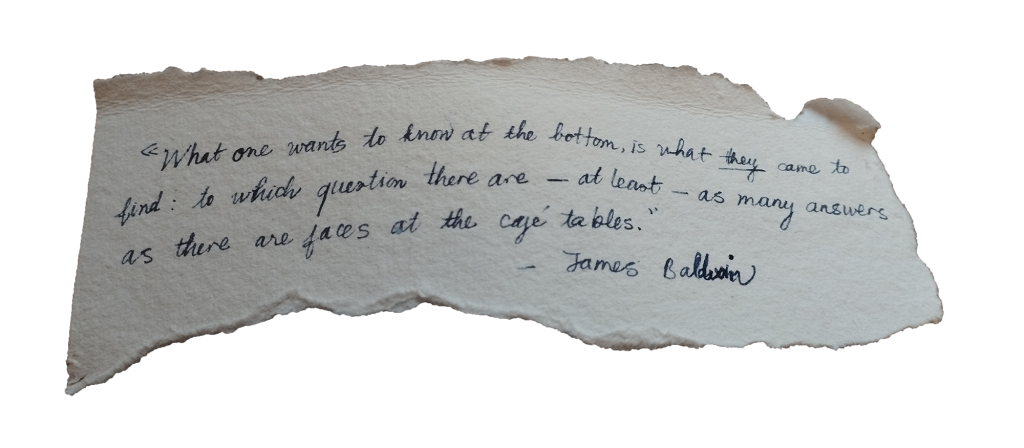
“What one wants to know at the bottom, is what they came to find: to which question
there are – at least – as many answers as there are faces at the cafe tables.”
(James Baldwin, “A Question of Identity”, p.124)
Speak up, a finger of mine touches a phrase in a book, a fresh smell. Why, I ask the page, and to whom, about what, in which way? I have no significant stories to tell and I don’t record sufferings. Mom complains about me not knowing what to do with my mouth. No, entering the roof of the mouth, there is a treasure chest. But it was cursed.
“the position taken”
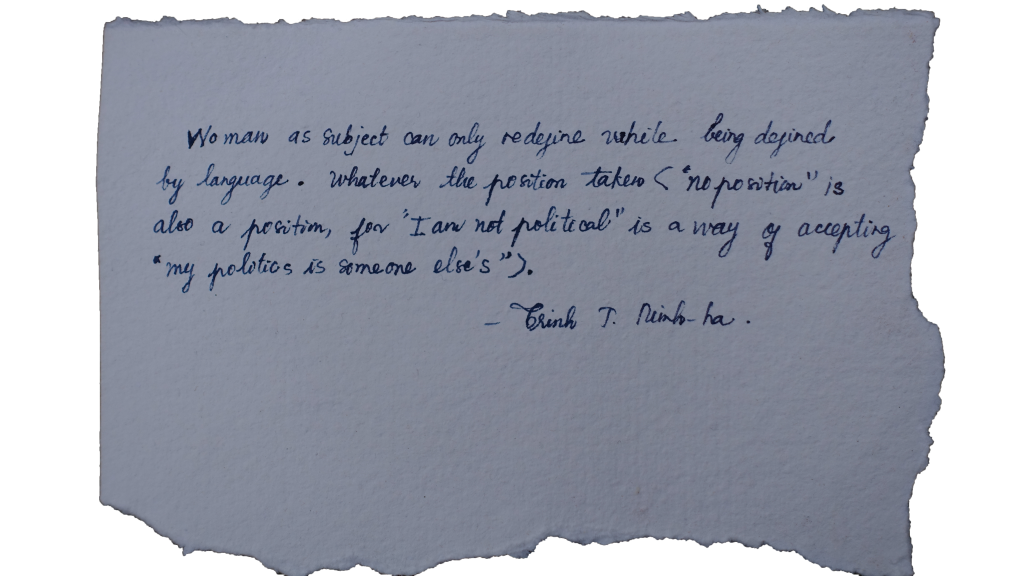
“Woman as subject can only redefine while being defined by language. Whatever the position taken (“no position” is also a position, for “I am not political” is a way of accepting “my politics is someone else’s”)
(Trinh T. Minh-ha, “Commitment from the Mirror-Writing Box,” p. 44)
Reading in and into a place.
Reading in and into a language.
Reading in and into a body.
The fully grey afternoon reassures me that not even a hope will be able to stay. Not even a little sunlight lingers on. But there are several steps to take until the darkness gets condensed and you will be ensnared with its beauty. One: wake the form, erect. Two: walk this way, avoid the names of deaths on the stones, so as not to wake them up. Don’t stumble. To bring back the fragments of your body, to be in solidarity with yourself, to hold up the form.
We will not melt into each other, not even in the form of spirits, I promise.
“to overcome”
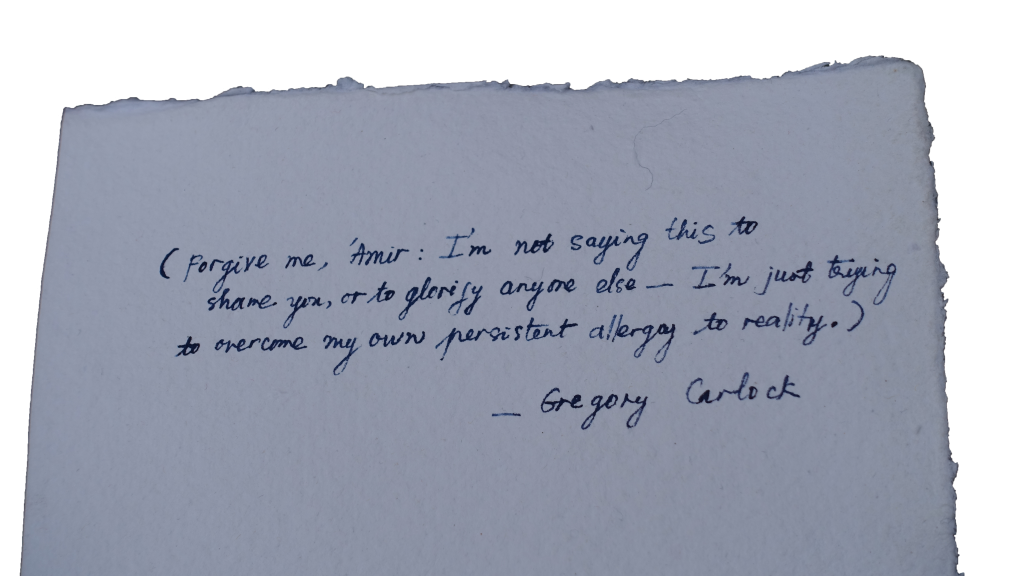
(Forgive me, ‘Amir: I’m not saying this to
shame you, or to glorify anyone else – I’m just trying
to overcome my own persistent allergy to reality.)
(Gregory Carlock, “To a Syrian Prisoner of Conscience,” p.13)
Poetry itches. Poetry thinks. Poetry acts. Poetry performs.
To overcome this itchy phase of writing.
“Ich liebe dich”

In a station, two men were happily insane writing these words of love on the dustbin, not knowing I had abandoned my train quietly admiring them for a while, realising I never knew how to write love, and no one like them had ever taught me to write love for the unwanted.
Ich liebe dich, dear dustbin, the bearer of the abandoned, the collector of the unrequited, the possessor of the undesired, the carrier of decomposed promises.
This love should remain intact, not to touch, not to be used, not to be reused.
Oh, I took it so seriously, what you were only teasing me about, years ago, when you said that you didn’t choose to love, you chose to love the wounded love. This city abounds with ruins and absences and recollections but I get lost on the way, approaching the archive of wounds, over and over again.
Once you rebuked me for stealing your word, a word lay bare by a riverbank and I had been waiting for so long to see if someone was coming to claim it. Then I unearthed it. I must let it continue, though I could have been more patient waiting.
****
Spontaneous words-touch:
David Grundy: “speak up” (from A True Account. The87Press, 2023.)
James Baldwin: “not enough” (from Nobody Knows My Name. Michael Joseph LTD, 1964.)
Trinh T. Minh-ha: “position taken” (from Women, Native, Other. Indiana University Press, 1989.)
Phùng Cung: “xem-vắng” (from Xem đêm. Nhã Nam & Hội Nhà Văn [Association of Writers], 2011.)
Gregory Carlock: “to overcome” (from To a Syrian Prisoner of Conscience. Falschrum, Berlin 2019.)
Reading list of 5:
- Phùng Cung. Xem đêm. Nhã Nam & Hội Nhà Văn
[Association of Writers], 2011. Vietnamese edition. - James Baldwin. Notes of a Native Son. Beacon Press, 1984.
- Trinh T. Minh-ha. Women, Native, Other.
Indiana University Press, 1989. - Gregory Carlock. To a Syrian Prisoner of Conscience.
With ink drawings by Stefan Maneval. Falschrum, Berlin, 2019. - Author unsourced. “Ich liebe dich…”
Words on a dustbin, seen at a station, Berlin, 23 December 2023.
Nhã Thuyên was born in Northern Việt Nam and works as a writer and editor in Hà Nội. Her most recent books are bất\ \tuẫn: những hiện diện [tự-] vắng trong thơ Việt and its English edition: un\ \martyred: [self-]vanishing presences in Vietnamese poetry (Roofbook, USA, 2019) and moon fevers (Tilted Axis Press, UK, 2019). English translations of her poetry and writing have appeared in the journals of RHINO Poetry, Asymptote, Diacritics, Eleven Eleven, Cordite Poetry Review, Sand, Full Stop, Cha: An Asian Literary Journal, Tongue, The Margins: Asian American Writer’s Workshop, Words Without Borders, the Lifted Brow, Jacket 2, Mekong Reviews, Gulf Coast, Exchanges: Journal of Literary Translation, Modern Poetry in Translation, The Kenyon Review and some other places. Her main practices are writing between languages, experimenting with translations and poetic exchanges. She’s been talking to walls and soliloquies some nonsense when having no other emergencies of life to deal with. Her next book of poetry vị nước (taste of water) has been waiting to see the moon. She is currently staying in Berlin as a 2023 DAAD artist-in-Berlin fellow.
Please note the views published in What I am Reading Now… are personal reflections of the contributors.
These may not necessarily represent the views of the University of Dundee.
Readers who wish to make a donation to support Medical Aid for Palestinians can do so here.
———
Previous Issue: Dayna Ash, February 2024
Next Issue: Mona Benyamin, April 2024
